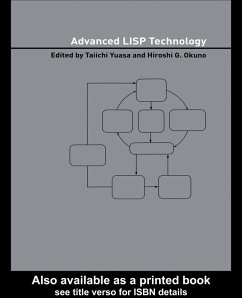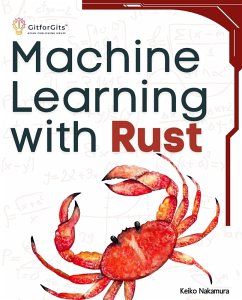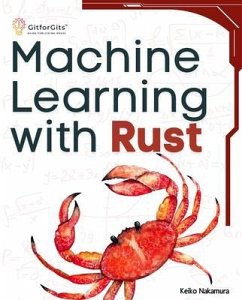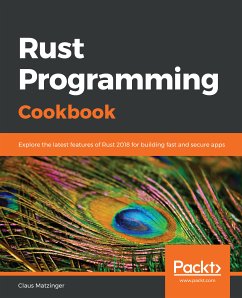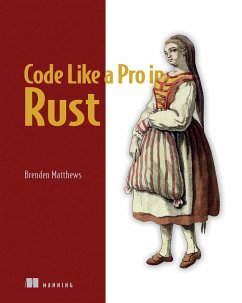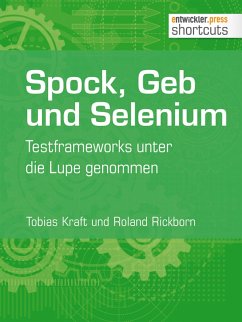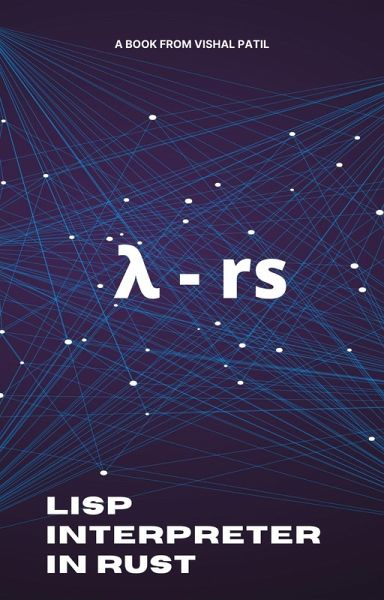
Lisp Interpreter in Rust (eBook, ePUB)
Sofort per Download lieferbar
9,99 €
inkl. MwSt.

PAYBACK Punkte
0 °P sammeln!
In this book, you will be learning to create an interpreter for a modified subset of Scheme, a Lisp dialect, using the Rust programming language. The interpreter will be implemented from scratch using standard Rust. Rust's rich programming constructs such as Enum, Pattern Matching, and Error Handling will make it easy and a joy to create a fully functional Lisp interpreter. With Rust's concise syntax, you will be amazed how fast you will be able to get an interpreter working with a few lines of code within a short period.The book is divided into three parts to ease the learning curve and not o...
In this book, you will be learning to create an interpreter for a modified subset of Scheme, a Lisp dialect, using the Rust programming language. The interpreter will be implemented from scratch using standard Rust. Rust's rich programming constructs such as Enum, Pattern Matching, and Error Handling will make it easy and a joy to create a fully functional Lisp interpreter. With Rust's concise syntax, you will be amazed how fast you will be able to get an interpreter working with a few lines of code within a short period.
The book is divided into three parts to ease the learning curve and not overwhelm the reader. The first part implements a fully-functional interpreter and a REPL (Read-Eval-Print-Loop). This interpreter will support limited data types, variables, if-else expressions, lambdas (functions), and lambda calls. With the core interpreter framework in place, the book's second part will extend the interpreter with more advanced data types such as strings, floats, and lists. This will be followed by additions to support functional programming constructs such as map, filter, and reduce. In the last part of the book, we will be adding support for closures and tail call optimization, which will make the interpreter extremely scalable for tail-recursive functions. You will have a Lisp interpreter with most of the modern functionality implemented by the end. The book will walk you through each piece of the Rust code and all the tests used to implement the functionality. In addition, there are exercises spread across the book, providing you with ideas to add new functionality.
This book offers a hands-on approach and does not dwell much on programming language theory. The goal is to teach you how to practically build interpreters or DSL (Domain Specific Language) frameworks using Rust. The book is highly focused and is relatively small (less than 120 pages), so if you are a moderately experienced programmer, you should be able to consume the book in a short period.
The book is divided into three parts to ease the learning curve and not overwhelm the reader. The first part implements a fully-functional interpreter and a REPL (Read-Eval-Print-Loop). This interpreter will support limited data types, variables, if-else expressions, lambdas (functions), and lambda calls. With the core interpreter framework in place, the book's second part will extend the interpreter with more advanced data types such as strings, floats, and lists. This will be followed by additions to support functional programming constructs such as map, filter, and reduce. In the last part of the book, we will be adding support for closures and tail call optimization, which will make the interpreter extremely scalable for tail-recursive functions. You will have a Lisp interpreter with most of the modern functionality implemented by the end. The book will walk you through each piece of the Rust code and all the tests used to implement the functionality. In addition, there are exercises spread across the book, providing you with ideas to add new functionality.
This book offers a hands-on approach and does not dwell much on programming language theory. The goal is to teach you how to practically build interpreters or DSL (Domain Specific Language) frameworks using Rust. The book is highly focused and is relatively small (less than 120 pages), so if you are a moderately experienced programmer, you should be able to consume the book in a short period.
Dieser Download kann aus rechtlichen Gründen nur mit Rechnungsadresse in A, B, CY, CZ, D, DK, EW, E, FIN, F, GR, H, IRL, I, LT, L, LR, M, NL, PL, P, R, S, SLO, SK ausgeliefert werden.





